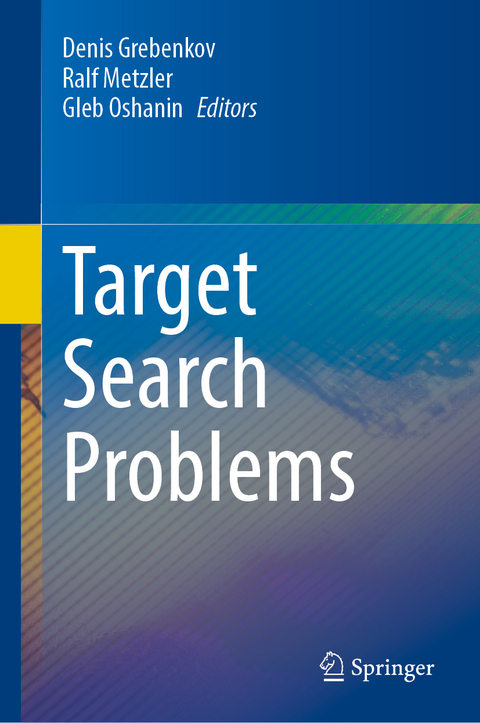
Target Search Problems
Springer International Publishing (Verlag)
9783031678011 (ISBN)
This book presents cutting-edge research addressing the mathematical models used to tackle the "Target problem" as it manifests itself in a wide range of disciplines. Leading international experts from around the world describe a variety of different approaches to this truly multidisciplinary topic.
Recent years have witnessed a substantial and still growing interest in understanding the general "Target problem". This encompasses a wide range of different situations in which some "agents" perform a deterministic or stochastic motion to search for a certain immobile or mobile "target". Such problems arise in many disciplines: to name but a few, computer science, the evolution of stock markets, biochemistry, bio-medicine, evolutionary games, as well as diverse areas of physics. This book with its up-to-date collection of chapters authored by leading experts in these and other fields, provides a comprehensive and complete picture in broadlyaccessible language.
The book will naturally serve as a source of inspiration for further research, as well as facilitating a cross-fertilization of approaches, ideas, and research directions.
Denis Grebenkov studied physics at the Department of Statistical Physics in Saint Petersburg State University (1995-1999). After receiving his Bachelor of Science in Physics with honors, Denis Grebenkov moved to Ecole Polytechnique in Paris, France, for the master program in theoretical physics (1999-2001), where he later obtained the PhD degree on theoretical physics specialized in Laplacian transport towards irregular interfaces under supervision by Professors Bernard Sapoval and Marcel Filoche (2001-2004). In parallel, he continued scientific research on a thermodynamic theory of relaxations in micellar solutions and obtained another PhD degree on statistical physics from Saint Petersburg State University under supervision of Professor Alexander Grinin (2001-2003). From 2004 to 2005 Denis Grebenkov was a post-doc in the experimental group of Dr. Geneviève Guillot at the University of Orsay (France) and studied confined diffusion of hyperpolarized helium-3 in the human pulmonary acinus for improving emphysema diagnostic. Then he got a Marie Curie postdoc position at the University of Naples (Italy) and worked on complex systems exhibiting a structural arrest in the field of soft and colloidal matter in the group of Professor Antonio Coniglio (2005-2006). In 2006, Denis Grebenkov obtained a permanent research position at CNRS (France) in the laboratory of Condensed Matter Physics. He received several prices and distinctions such as the Best PhD award from Ecole Polytechnique (2004), Giulio Cesare Borgia Prize for fundamental contributions to diffusion nuclear magnetic resonance (2010), Bronze Medal CNRS (2012), and Friedrich Wilhelm Bessel Research Award from the Alexander von Humboldt Foundation (2019). Denis Grebenkov authored 183 publications.
Denis Grebenkov investigates various diffusion-mediated phenomena in complex media, e.g., intracellular transport and cell signaling, transport in human organs, diffusion-controlled reactions in industrial devices. Two related fundamental questions are at the heart of this research: how the geometric complexity of a system affects its transport properties and functions, and what the observed diffusion characteristics can tell us about the geometric structure. To solve these forward and inverse problems, Denis Grebenkov employs various theoretical tools from statistical physics, probability, spectral theory, mathematical physics, theory of differential equations, etc. In parallel, he develops advanced numerical techniques (Monte Carlo simulations, finite-element methods, spectral methods, etc.) to incorporate the geometric complexity of natural and industrial systems and to bridge the gap between theory and applications.
Ralf Metzler studied physics at the University of Ulm (1989-1994) where he also obtained his PhD degree on anomalous dynamical phenomena with Theo Nonnenmacher. From 1998 to 2000 Ralf was a postdoc at Tel Aviv University, working with Yossi Klafter, and from 2000 to 2002 he was at MIT with Mehran Kardar. In 2002 Ralf was appointed as assistant professor (non tenure-track) at NORDITA (Nordic Institute for Theoretical Physics) in Copenhagen. In 2006 he became associate professor and Canada Research Chair in Biological Physics at the University of Ottawa. From 2007 Ralf was professor at Technical University of Munich, and since 2011 he is full professor for Theoretical Physics at the University of Potsdam. During 2010-2015 Ralf was also Finland Distinguished Professor (Academy of Finland) at Tampere University of Technology. From 2019-2022 Ralf was Alexander von Humboldt Honorary Research Scholar at Wroclaw University of Science and Technology, and in 2023 he was Heilbronn Distinguished Visiting Fellow in ISAAC Cambridge and University of Bristol, as well as Distinguished Visiting Professor at the Indian Institute of Technology Bombay. Currently is APCTP distinguished fellow at the Asia Pacific Center for Theoretical Physics, Pohang, Korea.
The Metzler
1. Intermittent motion of agents.- 2. Visual search.- 3. Subdiffusive search for a target.- 4. Superdiffusive search for a target.- 5. Evanescent searchers.
| Erscheinungsdatum | 29.12.2024 |
|---|---|
| Zusatzinfo | IX, 750 p. 150 illus., 135 illus. in color. |
| Verlagsort | Cham |
| Sprache | englisch |
| Maße | 155 x 235 mm |
| Themenwelt | Naturwissenschaften ► Physik / Astronomie ► Angewandte Physik |
| Schlagworte | Active Matter • Anomalous diffusion • Chemotaxis • Crowding effects • Distributions of targets • Evanescent searchers • Evasive targets • First passage problem • infotaxis • Mobile targets • Narrow Escape Problem • Rotating targets • Steric factors |
| ISBN-13 | 9783031678011 / 9783031678011 |
| Zustand | Neuware |
| Informationen gemäß Produktsicherheitsverordnung (GPSR) | |
| Haben Sie eine Frage zum Produkt? |
aus dem Bereich


